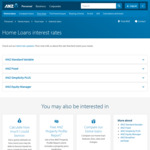Lowest ever fixed rate for a big 4 bank!
2.68% (CPR 4.40%) fixed 2 year owner occupied P&I home loan + up to $3,500 rebate +0.3% Bundle rebate!
Update 3/3/20: big 4 banks have already passed on the full 0.25% cut incl ANZ. Note this is for variable rates only.
Update 9/3/20: ANZ increase rebate to $4000 refinance >$250k, once per 12 month period. exp 31/5/20
Available under ANZ Breakfree package, including offset account, redraw, premium credit card. Annual fee $395.
Can be split with variable 100% offset. Fixed has break costs if closed before expiry. No break costs under variable.
Suggest doing rate lock.
ANZ fixed rates
2.68% (CPR 4.40%) fixed 2 year owner occupied P&I [3.48% interest only (CPR 4.53)]
2.88% (CPR 4.91%) fixed 2 year investor P&I
2.98% interest only investor (CPR 4.92%) fixed 2 year investor IO
ANZ variable rates
3.09% (CPR 4.65%) owner occupied P&I (Approx +0.5% interest only)
3.50% (CPR 4.87%) investor P&I (approx +0.2% interest only)
PLUS ANZ bank rebate:
$4,000 loan size above $250k
Total Fees eg NSW & VIC incl GST
https://www.nswlrs.com.au/getattachment/
https://www.propertyandlandtitles.vic.gov.au/
Mortgage discharge fees $143.5 (NSW), $116.80 (VIC)
Transfer/Mortgage Registration fee $143.5 (NSW), $116.80 (VIC)
Title search $14.70 (NSW)
Legal/settlement fee from incoming lender – Approx $100-$350
Discharge admin fee from outgoing lender – Approx $250-$350
Total fees approx $650 - $800 in most cases.
PLUS 0.3% Bundle Rebate
In ADDITION to bank rebates, Bundle Home Loans gives a rebate of 0.3% of loan size (net at drawdown) for ANY bank or product.
Why should I fix?
Given lower chance of a rate cut forecast, a low fixed rate can still save you more money as you can get an immediate benefit from today as opposed to waiting for the drop to occur. Given many banks are only passing on 0.1-0.15% each cut, and the RBA cash rate is 0.75%, there can only be a maximum of 3 cuts to zero, which may take a long time or unlikely to occur.
Always worth doing a calculation for your situation, eg:
If you have an existing loan and your rate is 3.18%, fixing at 2.68% will save you 0.5% each year.
On a $500k loan, that is a saving of $2500 every year.
If you're saving 0.5% and go with a lender giving rebates eg Westpac $6,000 for 2 properties, plus our Bundle Rebate of $1,500, that's a further $7,500 in rebates, plus $2,500 interest savings, you are getting a benefit of $10,000 in just one year!
Len
Bundle Property Home Loans
T: (02) 9698 7186
M: 0422354868
E: [email protected]
ACL 445947
Disclaimer:
The information provided is for general education purposes only and is not intended to constitute specialist or personal advice. This has been provided without taking into account your objectives, financial situation or needs. Because of this, you should consider the appropriateness of the advice to your own situation and needs before taking any action. It should not be relied upon for the purposes of entering into any legal or financial commitments. Specific investment advice should be obtained from a suitably qualified professional before adopting any investment strategy.



CPR 4.53% seems awfully high when you can get a CPR of 2.7% ( https://www.reduceloans.com.au/ )